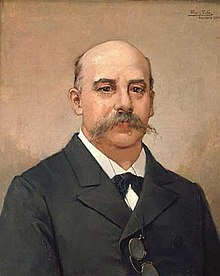Emilio Castelar y Ripoll
| Emilio Castelar y Ripoll | |
|---|---|

Castelar, by Josep Nin i Tudó.
|
|
| 4th President of the Spanish Republic 4th of the First Spanish Republic (1873–1874) |
|
|
In office 7 September 1873 – 3 January 1874 |
|
| Preceded by | Nicolás Salmerón |
| Succeeded by | Francisco Serrano |
| Personal details | |
| Born |
7 September 1832 Cádiz, Spain |
| Died | 25 May 1899 (aged 66) San Pedro del Pinatar, Spain |
Emilio Castelar y Ripoll (7 September 1832 – 25 May 1899) was a Spanish republican politician, and a president of the First Spanish Republic.
Castelar was born in Cádiz. He was an eloquent and literary man. He was appointed dictator of Spain in 1873, but not being equal to the exigency in the affairs of the state, he resigned, and made way for the return of monarchy, though under protest. He wrote a history of the Republican Movement in Europe among other works of political interest.
At the age of seven he lost his father, who had taken an active part in the progressist agitations during the reign of Ferdinand VII, and had passed several years as an exile in England. He attended a grammar-school at Sax. In 1848 he began to study law in Madrid, but soon elected to compete for admittance at the school of philosophy and letters, where he took the degree of doctor in 1853. He was an obscure republican student when the Spanish revolutionary movement of 1854 took place, and the young liberals and democrats of that epoch decided to hold a meeting in the largest theatre of the capital. On that occasion Castelar delivered his maiden speech, which at once placed him in the van of the advanced politicians of the reign of Queen Isabella.
From that moment he took an active part in politics, radical journalism, and literary and historical pursuits. Castelar was compromised in the first rising of June 1866, which was concerted by Marshal Prim, and crushed, after much bloodshed, in the streets by Marshals O'Donnell and Serrano. A court martial condemned him in contumaciam to death by garrote vil, and he had to hide in the house of a friend until he escaped to France. There he lived two years until the successful revolution of 1868 allowed him to return and enter the Cortes for the first time as deputy for Zaragoza. At the same time he resumed the professorship of history at the Madrid University. Castelar soon became famous by his rhetorical speeches in the Constituent Cortes of 1869, where he led the republican minority in advocating a federal republic as the logical outcome of the recent revolution. He thus gave much trouble to men like Serrano, Topete and Prim, who had never harboured the idea of drifting into advanced democracy, and who had each his own scheme for re-establishing the monarchy with certain constitutional restrictions. Hence arose Castelar's constant and vigorous criticisms of the successive plans mooted to place a Hohenzollern, a Portuguese, the Duke of Montpensier, Espartero and finally Amadeus of Savoy on the throne. He attacked with relentless vigour the short-lived monarchy of Amadeus, and contributed to its downfall.
...
Wikipedia
